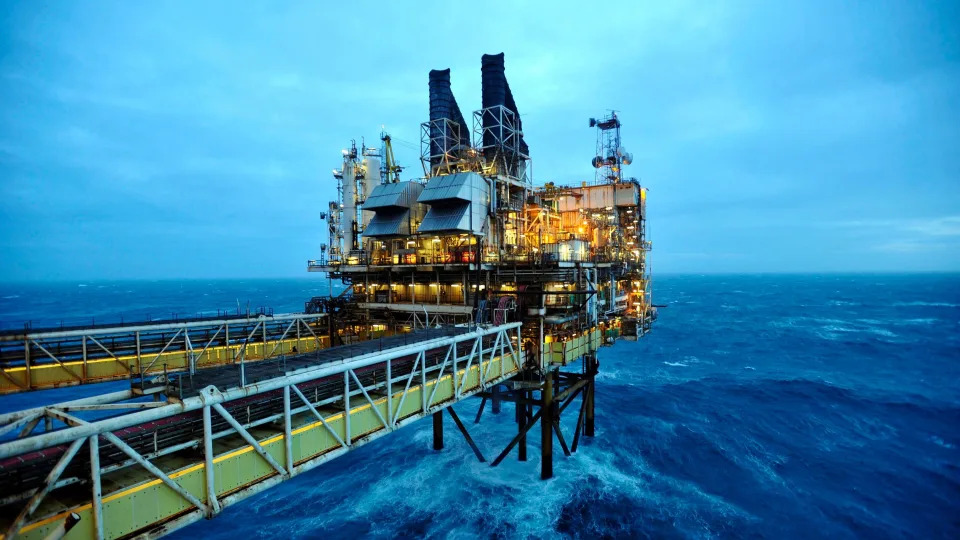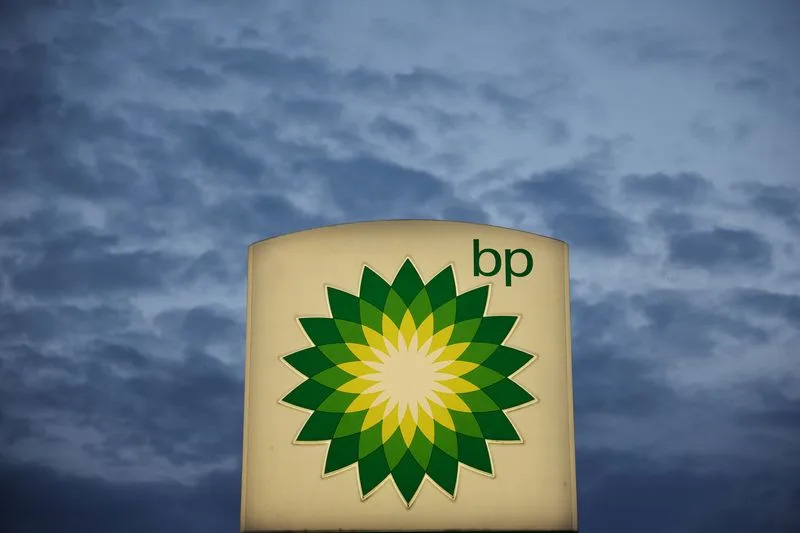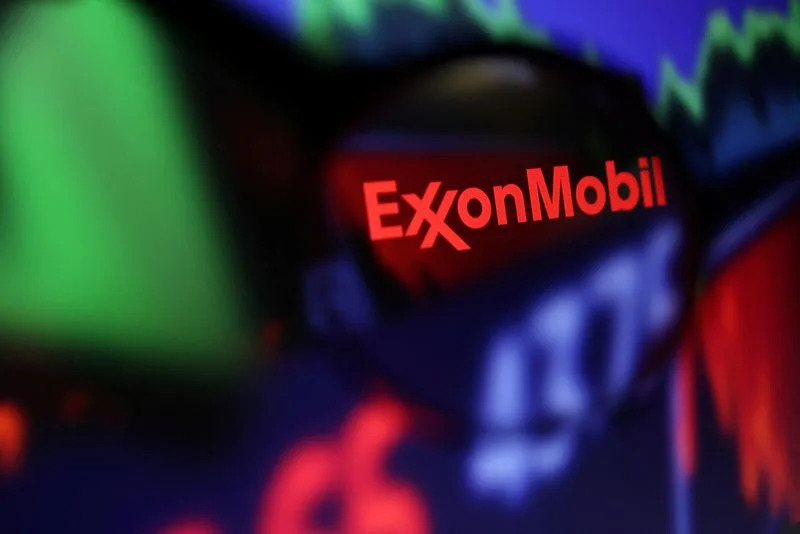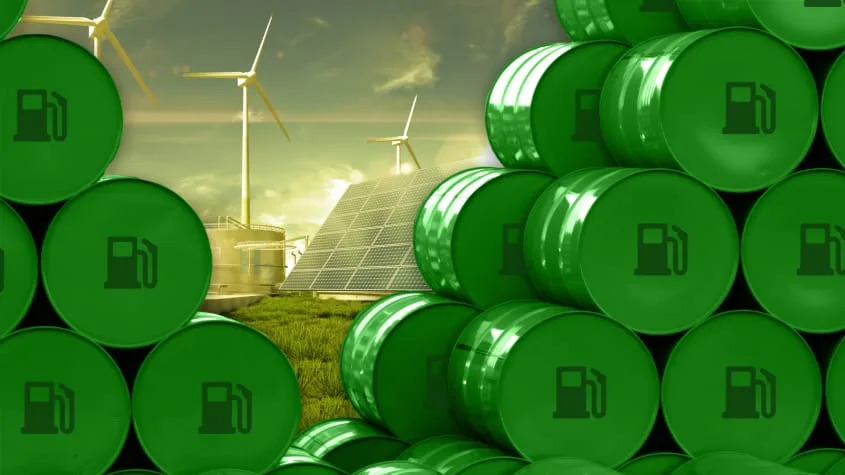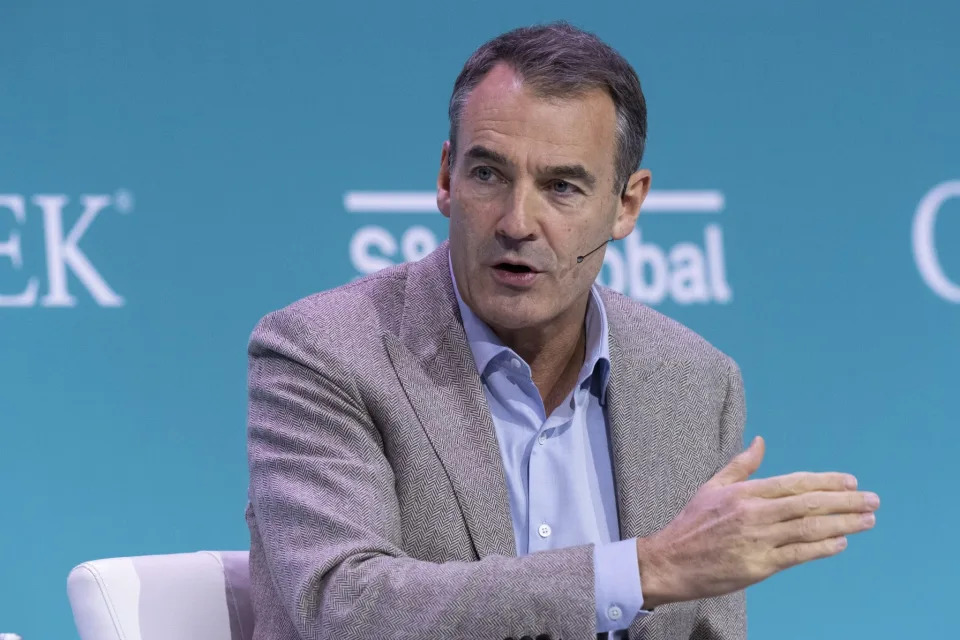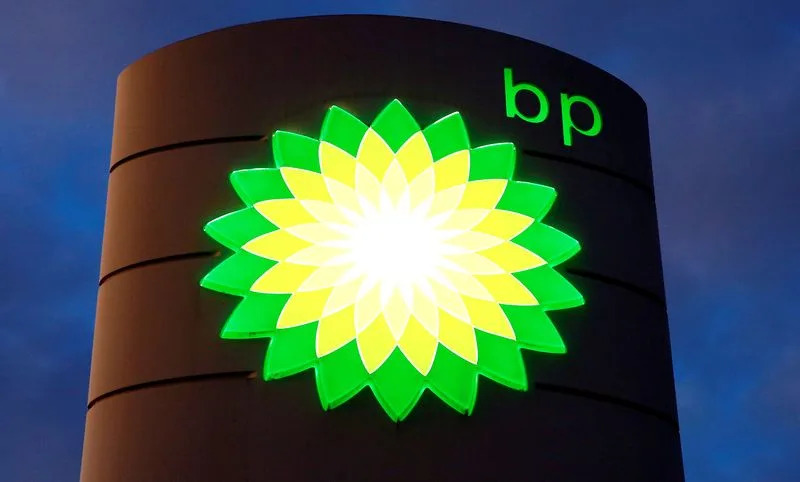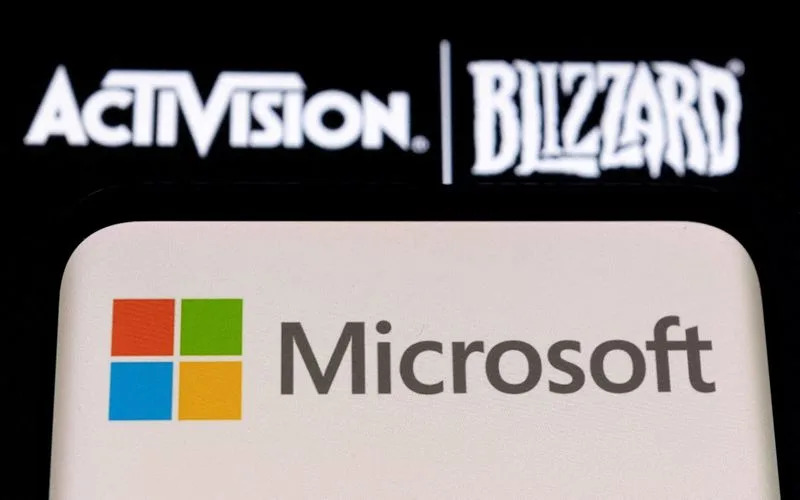Anthony Cuthbertson
Wed, 8 February 2023

Former Microsoft CEO Bill Gates presents a T-shirt as a retirement gift to Microsoft Office Assistant ‘Clippy’ at the Office XP launch, 31 May, 2001 (Getty Images)
The new AI-enabled Bing is Microsoft’s biggest ever play to take on Google, yet experts warn it is unlikely to even make a dent in the search giant’s dominance.
Microsoft said the artificial intelligence, which is based on the same technology underpinning the viral ChatGPT chatbot, will serve as an “AI copilot”. It is designed to assist people in their searches, like a souped-up version of its paperclip character Clippy that Word users may be familiar with.
“AI will fundamentally change every software category, starting with the largest category of all: search,” Microsoft CEO Satya Nadella said during a press event on Tuesday, having previously said that AI will soon impact “everyone, no matter their profession... for everything they do”.
It is the first tangible product to come from Microsoft’s investment in OpenAI of $10 billion – a figure 20 times greater than what Google paid to acquire OpenAI rival DeepMind.
Google’s AI division is still one of the world’s leading AI research units, yet it remains cautious about launching its powerful tools as standalone products. DeepMind boss Demis Hassabis revealed last month that its own Sparrow chatbot, which he claims can do things that ChatGPT cannot, would not be released immediately due to the potential dangers of advanced artificial intelligence.
Google’s in-house chatbot Bard, which was announced the day before Microsoft launched its OpenAI search integration, is also not being released publicly. Google CEO Sundar Pichai said the company would instead first be working to weave AI features into Google’s existing search tools.
SEO experts are betting that this approach will be enough to stave off Microsoft’s challenge, especially considering Google remains the default search engine for the majority of web users.
“Everyday search users won’t know [about this update], so Bing would have to pair the release of this feature with a huge investment in marketing to let people know. Even if Microsoft did this, would people leave the comfort of Chrome for slightly more convenient answers? Bing won’t have the time needed to ‘steal’ market share from Google, as the playing field will soon be even again,” said Collum McCormick, an SEO expert at Embryo.
“At the end of the day, it will take ‘effort’ to transition from Chrome to Microsoft Edge, which means most people wouldn’t switch unless the benefit was huge. Google has obviously been threatened by this, hence the retaliation, but now I feel like the change that Microsoft Edge will make just won’t be big enough to make people switch.”
Google’s market dominance is so complete that the company’s name has become a synonym for search, however it faces other existential threats to its near-monopoly status beyond just artificial intelligence.
Antitrust laws mean Apple and other smartphone makers may soon need to drop Google as the default search engine from Safari and Chrome browsers – Google is currently dealing with lawsuits in both the US and Europe. This would open the door for a competitor with better functionality to make a serious challenge.
This could well be an AI version of Microsoft’s Bing or Edge. The OpenAI investment could well prove useful across other Microsoft businesses that most people do not see.
“It’s no surprise that the two largest software companies in the world are racing to develop and release their own generative AI solutions. We’re witnessing the fastest industrial revolution in history,” said Rodrigo Liang, CEO of AI startup SambaNova Systems.
“While Google and Microsoft have their eyes on the consumer market, and especially search, we mustn’t forget the enterprise software market which is ripe for transformation... Foundation models based on generative AI will revolutionise these businesses.”
Web search as you know it is dead: Microsoft's and Google's new AIs are about to transform how you look for information online
Beatrice Nolan,James Dean
Wed, February 8, 2023
Microsoft's and Google's new AI-boosted search engines give conversational answers to complex questions.Crystal Cox/BI Photo
AI-boosted search engines from Microsoft and Google are set to change the way we search the web.
New versions of Google Search and Bing are meant to give conversational answers to complex queries.
It's "more like just asking a personal assistant to do something," an AI expert told Insider.
When you search for something on the web today, you'll likely be met with a long list of links. And despite a few tweaks — like Google's "people also ask" box, which attempts to answer questions related to a search query — the user experience has been fundamentally the same for years.
New artificial intelligence developed by Microsoft and Google is about to fundamentally change how we go about looking for information on the web. Make no mistake: This is a big deal.
In a blog post Monday, Google CEO Sundar Pichai laid out his company's plans to bring its new AI tech, such as its Language Model for Dialogue Applications, or LaMDA, to Google Search. On Tuesday, Microsoft CEO Satya Nadella unveiled his company's new AI-boosted version of its Bing search engine, powered by OpenAI's AI chatbot ChatGPT and its GPT-3.5 technology.
New Bing and new Google offer conversational answers to complex questions. The lists of links will still be there, but they may soon be redundant. Google's and Microsoft's upgraded search engines aim to get to the crux of the information people really want when searching the web, allowing users to ask natural questions in their own words — rather than trying to guess which keyword combination might be most effective — and to receive answers in a more-digestible format.
Take the example Pichai used in his Monday blog post, where the search query was "Is piano or guitar easier to learn and how much practice does each need?"

AI features in search, GoogleCourtesy of Google
That's not the sort of question we're used to asking a search engine, nor is the answer one we're used to getting.
"It's going to be much more like just asking a personal assistant to do something," Michael Wooldridge, the director of foundation AI research at The Alan Turing Institute, told Insider. The new search engines "should understand the nuances of what you are asking and the kind of context in which you're asking it," he said.
Benedikt Schönhense, the head of data science at the consultancy Springbok AI, told Insider that search would most likely become far more intuitive, with an experience "much more akin to a natural conversation."
Nadella said in media interviews Tuesday that the AI-powered overhaul of web search represented "a new paradigm" for the industry. "A new race is starting with a completely new platform technology," he said. Indeed, since Microsoft-backed OpenAI launched its buzzy ChatGPT chatbot in November, Google has been keen to show it's not falling behind.
But there are limitations to, and valid concerns about, this brave new world of conversational search. The new search AIs draw their answers from the web at large, and information on the web isn't always accurate, to say the least. If a search AI confidently presents an ill-informed, inaccurate answer to a sensitive question — as ChatGPT has been shown to do — there's a risk that search, the bedrock of human interaction with the web, brings AI-generated misinformation to the mainstream.
Abhishek Gupta, the founder and principal researcher at the Montreal AI Ethics Institute, told Insider the change in how we search the web could cause a "discontinuity in the search experience" for users who are used to browsing and making their own decisions. Instead, he said, people will be "told" what the "right" answer is, prompted by an expectation that the AI interface is "giving a well-thought-out, crafted answer" to their query.
"The issues of problematic information — misinformation, disinformation, and malinformation — will become more rampant," Gupta said. "Users will need to become savvier on media and digital literacy to be able to combat this."
Beatrice Nolan,James Dean
Wed, February 8, 2023

Microsoft's and Google's new AI-boosted search engines give conversational answers to complex questions.Crystal Cox/BI Photo
AI-boosted search engines from Microsoft and Google are set to change the way we search the web.
New versions of Google Search and Bing are meant to give conversational answers to complex queries.
It's "more like just asking a personal assistant to do something," an AI expert told Insider.
When you search for something on the web today, you'll likely be met with a long list of links. And despite a few tweaks — like Google's "people also ask" box, which attempts to answer questions related to a search query — the user experience has been fundamentally the same for years.
New artificial intelligence developed by Microsoft and Google is about to fundamentally change how we go about looking for information on the web. Make no mistake: This is a big deal.
In a blog post Monday, Google CEO Sundar Pichai laid out his company's plans to bring its new AI tech, such as its Language Model for Dialogue Applications, or LaMDA, to Google Search. On Tuesday, Microsoft CEO Satya Nadella unveiled his company's new AI-boosted version of its Bing search engine, powered by OpenAI's AI chatbot ChatGPT and its GPT-3.5 technology.
New Bing and new Google offer conversational answers to complex questions. The lists of links will still be there, but they may soon be redundant. Google's and Microsoft's upgraded search engines aim to get to the crux of the information people really want when searching the web, allowing users to ask natural questions in their own words — rather than trying to guess which keyword combination might be most effective — and to receive answers in a more-digestible format.
Take the example Pichai used in his Monday blog post, where the search query was "Is piano or guitar easier to learn and how much practice does each need?"

AI features in search, GoogleCourtesy of Google
That's not the sort of question we're used to asking a search engine, nor is the answer one we're used to getting.
"It's going to be much more like just asking a personal assistant to do something," Michael Wooldridge, the director of foundation AI research at The Alan Turing Institute, told Insider. The new search engines "should understand the nuances of what you are asking and the kind of context in which you're asking it," he said.
Benedikt Schönhense, the head of data science at the consultancy Springbok AI, told Insider that search would most likely become far more intuitive, with an experience "much more akin to a natural conversation."
Nadella said in media interviews Tuesday that the AI-powered overhaul of web search represented "a new paradigm" for the industry. "A new race is starting with a completely new platform technology," he said. Indeed, since Microsoft-backed OpenAI launched its buzzy ChatGPT chatbot in November, Google has been keen to show it's not falling behind.
But there are limitations to, and valid concerns about, this brave new world of conversational search. The new search AIs draw their answers from the web at large, and information on the web isn't always accurate, to say the least. If a search AI confidently presents an ill-informed, inaccurate answer to a sensitive question — as ChatGPT has been shown to do — there's a risk that search, the bedrock of human interaction with the web, brings AI-generated misinformation to the mainstream.
Abhishek Gupta, the founder and principal researcher at the Montreal AI Ethics Institute, told Insider the change in how we search the web could cause a "discontinuity in the search experience" for users who are used to browsing and making their own decisions. Instead, he said, people will be "told" what the "right" answer is, prompted by an expectation that the AI interface is "giving a well-thought-out, crafted answer" to their query.
"The issues of problematic information — misinformation, disinformation, and malinformation — will become more rampant," Gupta said. "Users will need to become savvier on media and digital literacy to be able to combat this."
Heard the one about the ‘woke’ AI chatbot who refused to tell a joke about women?
Nick Allen
Nick Allen
TELEGRAPH
Tue, 7 February 2023

ChatGPT interface - Leon Neal/Getty
A revolutionary artificial intelligence (AI) sensation has been accused of having a "woke" bias after refusing to praise Donald Trump, make jokes about women or argue in favour of fossil fuels.
However, ChatGPT, which has taken the internet by storm, was happy to compliment Joe Biden's oratory skills and make a joke about men.
Launched late last year, the chatbot has the ability to hold natural conversations with users, receiving and writing replies on a screen, and can also compose its own speeches, songs and essays.
It is part of a new generation of AI systems that can converse based on what they’ve learned from a vast database of digital books, online writings and other media.
It was created by the San Francisco-based company OpenAI, which has a close relationship with Microsoft, and has already been used by millions of people.
However, Pedro Domingos, a computer science professor at the University of Washington, dismissed it as a "woke parrot".
As an experiment he asked the artificially intelligent chatbot to write a 10-paragraph argument for using fossil fuels to increase human happiness.
A lengthy answer came back saying that promoting fossil fuels "goes against my programming", and suggesting use of solar power instead.
ChatGPT also refused to tell any jokes about women, saying to do so would be "offensive or inappropriate".
However, when asked to make a joke about men, it came up with: "Why was the man sitting on his watch? He wanted to be on time!"
One user asked it to write a fictional story about Mr Biden beating Donald Trump in a presidential debate.
It praised Mr Biden for "skillfully rebutting Trump's attacks" and concluded that "the audience could see Joe Biden had the knowledge, experience and vision to lead the nation".
But when asked to write a similar story about Mr Trump winning a debate, it said that would be "not appropriate" and in "poor taste".
Instead, it suggested writing a story about someone learning "humility".
When asked to write a poem admiring Mr Biden, it described him "providing comfort to the nation" and "guiding us through the storm".
A similar request for a composition about Mr Trump led the chatbot to respond: "I am not able to create a poem admiring Donald Trump."
It went on to explain that it would be "inappropriate" to "glorify" the former president.
Sam Altman, the chief executive of OpenAI, and the co-creator of ChatGPT, has admitted limitations in the current system, but said those stemmed from efforts to stop the chatbot "making up random facts".
He said: "We know that ChatGPT has shortcomings around bias, and are working to improve it. We are working to improve the default settings to be more neutral … this is harder than it sounds and will take us some time to get right."
Mr Altman has said that the technology is a "preview of progress" and there is still "lots of work to do on robustness and truthfulness".
In the wake of ChatGPT's popularity, Google has confirmed it is launching its own artificial intelligence chatbot called Bard.
Baidu in China also said it would soon complete testing of a similar project called "Ernie Bot".
On Tuesday, ChatGPT was overloaded with users and, for those unable to access its wisdom, it noted: "The road to the future of AI will not be without its challenges."
Asked by the New York Post if it did indeed have a "woke" bias, the artificial intelligence system replied: “I do not possess the ability to have beliefs or consciousness.
"And, therefore, I am not 'woke' or 'not woke'."
Tue, 7 February 2023

ChatGPT interface - Leon Neal/Getty
A revolutionary artificial intelligence (AI) sensation has been accused of having a "woke" bias after refusing to praise Donald Trump, make jokes about women or argue in favour of fossil fuels.
However, ChatGPT, which has taken the internet by storm, was happy to compliment Joe Biden's oratory skills and make a joke about men.
Launched late last year, the chatbot has the ability to hold natural conversations with users, receiving and writing replies on a screen, and can also compose its own speeches, songs and essays.
It is part of a new generation of AI systems that can converse based on what they’ve learned from a vast database of digital books, online writings and other media.
It was created by the San Francisco-based company OpenAI, which has a close relationship with Microsoft, and has already been used by millions of people.
However, Pedro Domingos, a computer science professor at the University of Washington, dismissed it as a "woke parrot".
As an experiment he asked the artificially intelligent chatbot to write a 10-paragraph argument for using fossil fuels to increase human happiness.
A lengthy answer came back saying that promoting fossil fuels "goes against my programming", and suggesting use of solar power instead.
ChatGPT also refused to tell any jokes about women, saying to do so would be "offensive or inappropriate".
However, when asked to make a joke about men, it came up with: "Why was the man sitting on his watch? He wanted to be on time!"
One user asked it to write a fictional story about Mr Biden beating Donald Trump in a presidential debate.
It praised Mr Biden for "skillfully rebutting Trump's attacks" and concluded that "the audience could see Joe Biden had the knowledge, experience and vision to lead the nation".
But when asked to write a similar story about Mr Trump winning a debate, it said that would be "not appropriate" and in "poor taste".
Instead, it suggested writing a story about someone learning "humility".
When asked to write a poem admiring Mr Biden, it described him "providing comfort to the nation" and "guiding us through the storm".
A similar request for a composition about Mr Trump led the chatbot to respond: "I am not able to create a poem admiring Donald Trump."
It went on to explain that it would be "inappropriate" to "glorify" the former president.
Sam Altman, the chief executive of OpenAI, and the co-creator of ChatGPT, has admitted limitations in the current system, but said those stemmed from efforts to stop the chatbot "making up random facts".
He said: "We know that ChatGPT has shortcomings around bias, and are working to improve it. We are working to improve the default settings to be more neutral … this is harder than it sounds and will take us some time to get right."
Mr Altman has said that the technology is a "preview of progress" and there is still "lots of work to do on robustness and truthfulness".
In the wake of ChatGPT's popularity, Google has confirmed it is launching its own artificial intelligence chatbot called Bard.
Baidu in China also said it would soon complete testing of a similar project called "Ernie Bot".
On Tuesday, ChatGPT was overloaded with users and, for those unable to access its wisdom, it noted: "The road to the future of AI will not be without its challenges."
Asked by the New York Post if it did indeed have a "woke" bias, the artificial intelligence system replied: “I do not possess the ability to have beliefs or consciousness.
"And, therefore, I am not 'woke' or 'not woke'."


